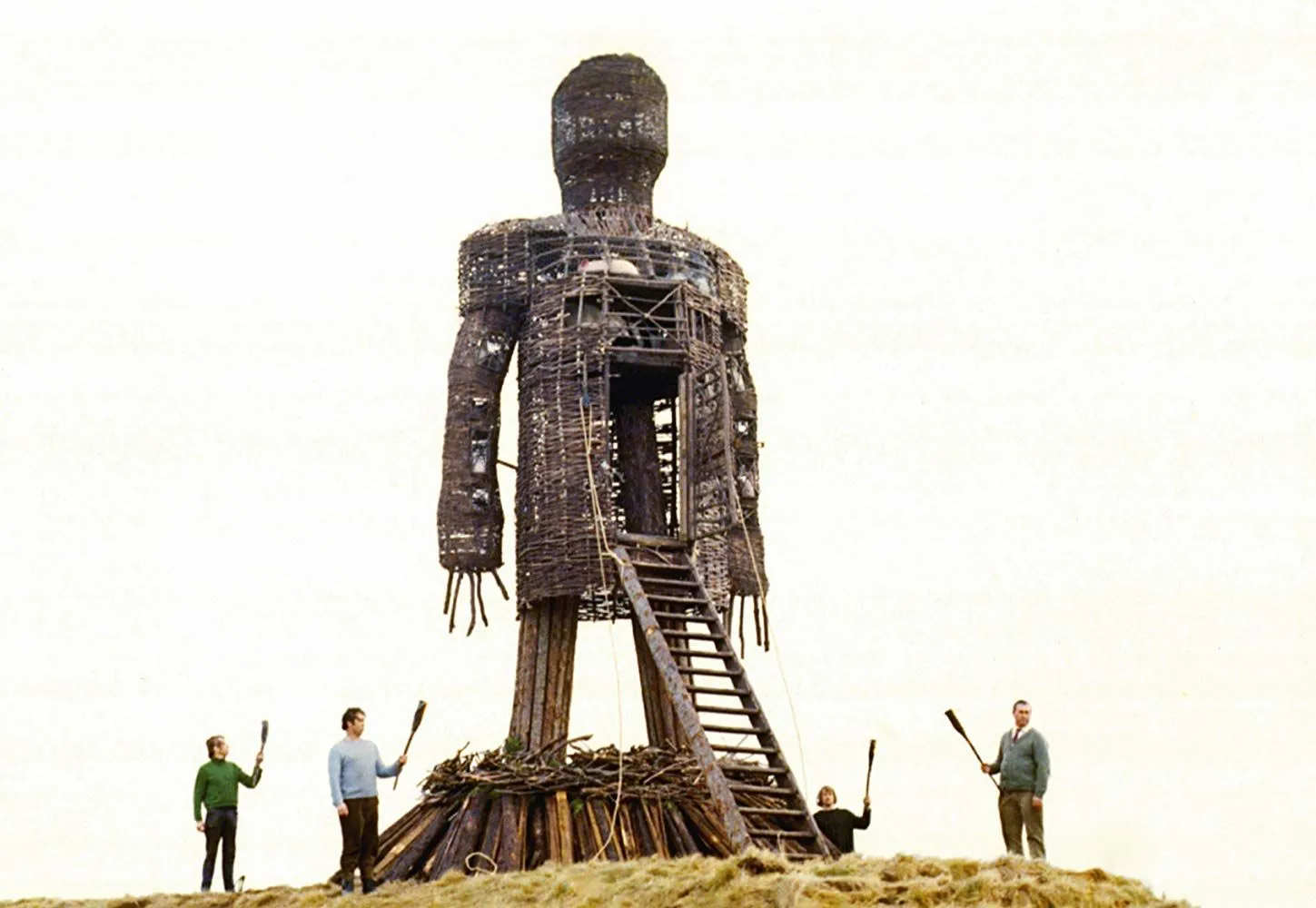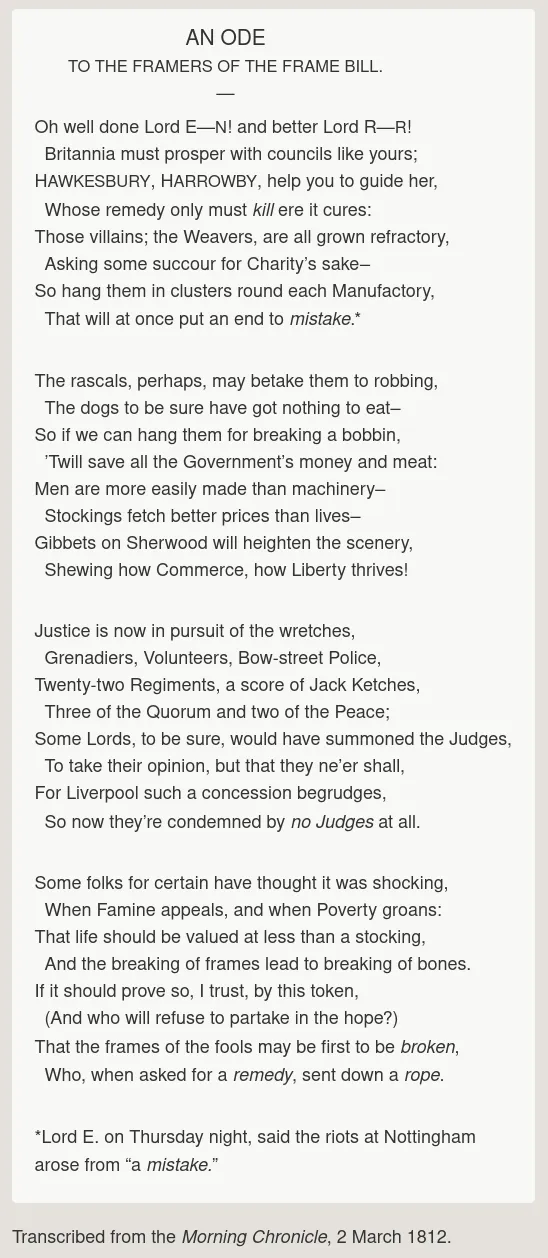
Engines of Mischief
In 1812, a decree was sent forth from Ned Ludd’s office in Sherwood Forest that called upon all Machinery hurtful to Commonality to be destroyed. This was not the first call to action issued by an anonymous group centered around the figure Ned Ludd. A year earlier the Luddites decreed, If the workmen dislike certain machines, it was because of the use to which they were being put, not because they were machines or because they were new.1 The letters were distributed by an anonymous group of skilled tradespeople, mainly in the textile industry. These artisans sought political reform through various means: violent action, letter writing, and other forms of protest.
Our friend Lord Byron wrote poems about some manufacturing affair, and later he addressed Parliament to unsuccessfully oppose the Frame Work Bill, legislation designed to turn the destruction of manufacturing frames into a capital offense. The bill was written as a response to the Luddites, who over the course of February 1811 to June 1812, destroyed stocking frames in the East Midlands, shearing frames in Yorkshire, and power looms in part of Lancashire.
Byron’s ‘Ode to the Framers of the Frame Bill’, published in the Morning Chronicle on March 2, 1812.
Published anonymously four days after his speech on this topic in the House of the Lords on February 27, 1812.

In Byron’s poem, we can see the rhetorical tactics used mainly fall on the side of irony. The standout lines come in the middle of the second stanza:
Men are more easily made than machinery -
Stockings fetch better prices than lives -Lord Byron ironiously calls upon the workers to be killed because Those villains; the Weavers, are all grown refractory / Asking some succour for Charity’s sake — / So hang them in clusters round each Manufactory. Byron would be called based in contemporary speech. Yet nowadays, we’ll only post memes on Instagram to voice our consternation, a crucial way that tech has subverted attentions and strategies. These memes are no longer happening right in front of ruling class. The rulers can simply ignore them. Back in the day, factory owners and machinery were destroyed, much less an angry letter was written and posted on a public place for everyone to see. Based Byron closing out his writ with the threat of death, a common sign-off for these types of letters:
That the frames of the fools may be first to be broken,
Who, when asked for a remedy, sent down a rope.Byron calls for compassion, then concludes the poem in a somewhat ambiguous way. I can imagine a poetry workshop teacher asking about that Who in the last line.
Outside of Lord Byron penning wit, the Luddites commonly re-appropriated speech patterns of the ruling class. In these proclamations, the Luddites sought redress for grievances acted upon them by factory owners, who the Luddites charged them with a diverse amount of fraudulent and oppressive act that have reduced a large number of workers into poverty. Much of this letter resembles an official proclamation given in the language used in the opening statement:
Whereas, it hath been represented to us: the General
Agitators, for the Northern Counties, assembled to
redress the Grievances of the Operative Mechanics...The letter’s conclusion charges one textile-factory owner, a Mr. Charles Lacy, with making himself rich through the exploitation of his textile workers, who in certain terms would’ve been part of the same trade union. In breaking the machinery, the frameworkers were merely responding to exploitative practices enacted upon them by the owners of the production facilities. Much akin to maybe today with gig-work, where anyone can dream of technology liberating people from labor all by driving for Uber or collecting someone’s groceries with Door Dash.
I’m of the mindset that you should probably go get your own damn groceries.
Through reading some of the letters written by the Luddites, I love the parody and re-appropriation of form and language used. I’ll write more about that in length in a later essay. For now, I’d like to focus my attention on a letter dated November 28, 1811, an Address from the Framework-Knitters to the Gentlemen Hosiers. The letter’s chief claim is that the Framework-Knitters is a staple Industry and that they support the community, but through the exploitative practices the community has been exposed to Evils. Enter Moloch, the child-sacrificial vessel referenced in the biblical verse at the beginning of the article, the letter goes on to describe the social life of the community in Nottingham:
We wish to live peacably and honestly by our Labour,
and to train up our Children in the paths of virtue
and rectitude, but we cannot accomplish our wishes.
Our Children, instead of being trained up by a regular
course of Education, for social life, virtuous
employments, and all the reciprocal advantages of
mutual enjoyment, are scarce one remove from the
Brute, are left to all the dangerous Evils attendanton
an uncultivated Mind, and often fall dreadful Victims
to that guilt, which Ignorances is the parent of.The East Midlands Nottingham group came at them in a respectful manner. Perhaps most of the time, the Luddites here seemed non-violent.